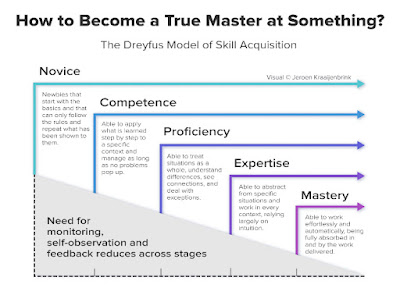Already in 1980, Stuart and Hubert Dreyfus wrote a phenomenal article with the title “A five stage model of the mental activities involved in directed skill acquisition.” Ever since, it is a reference model and foundation for how someone develops from novice to master.
The five stages are:
• Novice: newbies that start with the basics and that can only follow the rules and repeat what has been shown to them.
• Competence: able to apply what is learned step by step to a specific context and manage as long as no problems pop up.
• Proficiency: able to treat situations as a whole, understand differences, see connections, and deal with exceptions.
• Expertise: able to abstract from specific situations and work in every context, relying largely on intuition.
• Mastery: able to work effortlessly and automatically, being fully absorbed in and by the work delivered.
This is not just to create some sort of hierarchy or levels. The main relevance is that people learn differently at different stages.
At the Novice and Competence stages, learning needs to be rule-driven and instruction-based. Learners need a clear process and guidelines that they can understand and follow.
At the Proficiency and Expertise stages, learning is much more based on personal development and gaining experience in different circumstances.
And, at the Mastery stage, learning is entirely individual. Rather than listening to a trainer or practicing cases, at this stage the best way to learn is to figure things out yourself.

No comments:
Post a Comment